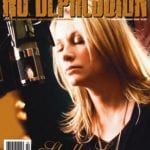The Replacements: All Over But The Shouting: An Oral History
Former Replacements frontman Paul Westerberg is modern rock’s tenderest songwriter and its thorniest character, a contradiction journalists have been laboring for twenty years to reconcile. That author Jim Walsh, a longtime Minneapolis music journalist with ties to the band (he and Westerberg are friendly, and he gave a eulogy at former guitarist Bob Stinson’s funeral), can’t seem to sort it out says less about him than it does about Westerberg, whose stony opacity makes Dylan seem like Courtney Love.
All Over But The Shouting: An Oral History, the only Mats biography ever published, near as anyone can tell, relies upon firsthand accounting from relatives, peers, reporters, scenesters and long-suffering friends (none of the band’s original lineup cooperated with Walsh, though drummer Chris Mars sent an email).
It proceeds on parallel tracks. As a charting of the band’s rise from the bottom to the middle, it’s entertaining and instructive, serving as a particularly fine travelogue through the early ’80s Minneapolis of Husker Du and Soul Asylum. That members of both bands turn up here makes the Mats’ absence all the more glaring. (It doesn’t help matters that reprinted excerpts from Westerberg’s past interviews are the most cutting, keenly observational passages here.)
All Over also serves as a stupefying and by no means exhaustive accounting of the band’s legendary misdeeds. Their bottomless appetite for booze, drugs and casual cruelty, as well as their boundless contempt for fans, label executives and each other, is palpable throughout. Alternately comical and grim, the book manages consistently to horrify while still probably understating its case. A witness recalls watching Westerberg gleefully destroy the demo tape of a young fan in the fan’s presence. R.E.M. guitarist Peter Buck remembers having to throw out all his condiments after a visiting Bob Stinson urinated in his refrigerator. (“I haven’t been able to eat mayonnaise since,” says Buck.)
In the book’s most difficult passages, various observers recount the unceremonious dismissals of manager and unofficial fifth member Peter Jesperson and band co-founder Stinson. The former rebounded after rehab (“In my bitterest moments, I can say they tried to flush me down the toilet,” Jesperson told Walsh); the latter overdosed in 1995.
After Bob left, goes the general consensus, it was all over. A rotating series of mostly local musicians replaced Stinson and then Mars, and it’s either because of or in spite of their short association with the band that they provide some of the book’s most illuminating passages. “It was a frustrating band to be in,” recalls late-period drummer Steve Foley, in what is likely a vast understatement. “Sometimes I think that bad karma has kept [Westerberg] from making it bigger than he did.”
Walsh neither emphasizes nor underplays the band’s peccadilloes, though he does a crack job of outlining how the things Mats fans loved best — their ramshackle charm, their drunken disinterest in things like actually finishing gigs — were the things that turned rancid in the end.
He does an even better job exploding the long-nourished myth that the only thing stopping the Replacements — the greatest band that almost was, “the little engine that could, but didn’t fucking feel like it,” in the words of one long-ago witness — from being superstars was a lack of inclination. “I’m not going to say, ‘Oh man, we could have, we could have, if only we just waited,'” Westerberg recounts to a journalist (not Walsh) late in the book. “Bullshit! We could not. We tried; we failed.”




